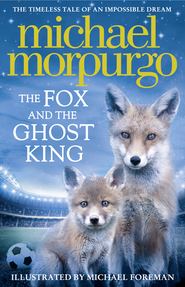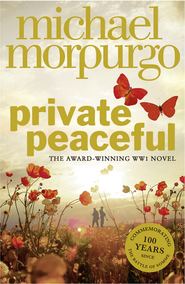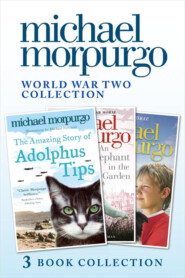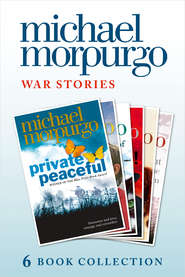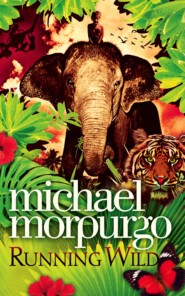По всем вопросам обращайтесь на: info@litportal.ru
(©) 2003-2024.
✖
Unforgettable Journeys: Alone on a Wide, Wide Sea, Running Wild and Dear Olly
Настройки чтения
Размер шрифта
Высота строк
Поля
Aunty Megs may have been the kindest person in the world, but she could be firm – we soon discovered that. She was appalled when it became clear – as of course it very soon did – that neither Marty nor I had been to school, and so neither of us could read properly nor write. So from then on she’d sit us down every morning at the kitchen table and teach us, regular as clockwork. I won’t pretend that either of us were willing pupils – we just wanted to be outside messing around, climbing trees, riding Big Black Jack, making camps, talking to Henry or Poogly or trying to cheer up poor old Barnaby. It took hours sometimes to get an ee-aw out of Barnaby. An ee-aw we reckoned was as good as a laugh, so we always stayed with him till we got one. And when it rained we’d far prefer to be out with Aunty Megs in her big garden shed where she made her model boats, where we’d make them with her – she taught us that too.
But lessons, she said, had to come first. We didn’t argue with her, not because we were ever even remotely frightened of her, but because both of us knew that she always had our best interests at heart. She made no secret of her affection for us, nor her wish to give us the best upbringing she could. “One day,” she told us, “you’ll have to leave here and go out into the big world out there and earn your living like everyone else. To do that you need to learn. The more you learn now, the more interesting your life will be.” So the two of us buckled down to our lessons, often reluctantly perhaps, but without protest.
As part of her teaching Aunty Megs told us stories, tales she’d learned from the bushmen, folk tales from England. She’d read us legends. By the stove in the evenings she’d read us a novel, a chapter a night, Treasure Island by Robert Louis Stevenson (we asked for that again and again). There were the Just So Stories by Rudyard Kipling, Little House on the Prairie and Heidi. She loved Heidi, and she was going to read it to us, she said, even though she knew it was a girl’s book. But our favourites were the William books by Richmal Crompton. Sometimes she’d be laughing so much she couldn’t go on. (Later when we could read properly, we read a bit of one of them to Barnaby, but he didn’t find it funny at all. Not a single ee-aw.)
But most of all Aunty Megs loved poetry. It was Mick, she said, who had given her a love for the sound of words. He’d read to her often, usually poems about the sea. Sea Fever and Cargoes, and The Yarn of the Nancy Bell, which always made us giggle, and Mick’s favourite – The Rime of the Ancient Mariner. She’d sit back in her chair and read them to us, and every time her words would take us again down to the sea. Fifty years or more later I still love all of them, and The Rime of the Ancient Mariner is the one I love best. I know it by heart, start to finish. Every time I read it, and I read it often, I can hear her voice in my head. She wrote her own poems too she told us, but that she did in private, and however much we badgered her to read them to us, she never did. “My poems are like a diary,” she said, “and for no one’s eyes but mine.”
Aunty Megs was an intensely private person. You always knew when you’d asked one question too many, like when Marty was looking at the photo on the mantelpiece of Mick in his sailor’s uniform holding the hand of a little boy. When he asked her who he was, she didn’t reply. When he asked once more, she said. “No one you know, and no one I know either.” And the sudden coldness in her voice made it very clear she was going to say nothing more about it. We always thought it must have been her son of course, but we never dared to ask her ever again.
There really was so much that was wonderful at Aunty Megs’, so much that changed my life. For a start we’d found a mother, and maybe as a result Marty and I became like real brothers there. We learned together how to build boats, only model ones maybe, but these model boats were the beginning of our lifetime love affair with the sea. We’d listen to Aunty Megs reading her sea poems, and talk long into the night about how we were both going to go to sea and be sailors like Mick had been. And I learned The Ancient Mariner by heart and recited it for Aunty Megs on her birthday. She listened with her eyes closed, and when they opened after I’d finished they were full of tears and full of love. Marty said it wasn’t bad, but that I’d made a mistake and left out a verse. So I threw the cushion at him and he threw one at me. We both missed, and then all three of us were laughing. Henry came bustling in then to see what the noise was all about, took one look at us, decided we were mad, picked up the cushion, turned and walked right out again. I was happier in that moment than I’d ever been in all my life, happy as Larry.
Scrambled Eggs and Baked Beans (#ulink_aa09d657-c798-5b38-9e09-df01df7f09c0)
We’d been living at the Ark for about four or five years when Aunty Megs had her accident. Marty and I had been swimming in the river. We did that most days, when the weather was right, if there was enough water in the river. Swimming was something else Aunty Megs had taught us. “Almost as important as poetry,” she’d say. “Best exercise there is. Could save your life one day too!”
We came wandering back up to the house, but when we called for Aunty Megs she wasn’t there. A quick look at the empty compound told us what she was doing and where she was. She’d gone off on one of her rides into the bush, hoping to release some of her little fellows, her family of animals. Normally she’d be gone for an hour or two, no more. But after several hours there was still no sign of her. We decided we shouldn’t wait any longer, that we had to go out looking for her.
I was leading Big Black Jack out of the paddock when we saw her horse come galloping riderless down the track from the hills. We didn’t waste any time then, but rode back up the way her horse had come, calling for Aunty Megs as we went. We knew roughly where it was she usually went to release her animals – the same area she’d found us all those years before. So that’s where we headed now, both of us on Big Black Jack, Aunty Megs’ horse following along behind. After a while we heard her singing, singing out loud – later she told us the singing helped to take her mind off her pain.
We found her out in the open beyond the trees, sitting with her back up against a rock, her family of animals scattered all around her. She was holding her arm tight to her chest, and had a nasty gash down one side of her face. There was so much blood all over her. Her shirt was soaked with it, both hands and her neck. She smiled up at us. “Am I glad to see you,” she said. “Don’t worry about the blood. Got plenty more where that came from. Just get me up and take me home, there’s good boys.”
She was already too weak to walk very far, so we knew that somehow we had to get her on to her horse. It wasn’t at all easy. We had to find the right tree stump to use as a mounting block, then help her up into the saddle. I could see her shoulder was paining her dreadfully. I led the way on Big Black Jack while Marty rode up behind Aunty Megs, holding her steady in the saddle all the way home. Then I rode on into town for the doctor. It turned out she needed a dozen stitches in her face and that she’d broken her collar bone. He put a sling on her, and told her also that she’d lost a lot of blood and had to rest up for a while, a month at least, maybe more. She said, “Phooey.”
The doctor stood there then, wagging his finger. “Don’t you phooey me, Megs Molloy,” he told her. “This is serious. You’re to keep that sling on and stay still. These boys of yours’ll look after you. You stay put, you hear me? Doctor’s orders.” And then he turned to us. “And if she tries to get up and go off looking for her little animals, you have my permission to lock her in.” I think he was only partly joking.
Marty and I took him at his word. Now we were looking after Aunty Megs, which made a change. We made a deal with her. You tell us what to do and we’ll do it, we said. But she had to stay put, stay still, rest as the doctor had told her. She agreed, reluctantly. So that’s what happened. She only had to tell us what to do for a few days until we got into some kind of routine. After that we just got on with it. We took turns at everything we didn’t much like doing – which was mostly the cooking and the washing up and the laundry.
Aunty Megs taught me from her sofa how to make scrambled egg on toast. She was very detailed and specific in her instructions. She allowed no deviation. Beat the eggs, bit of salt, bit of pepper, some milk. You had to spread the butter on the toast, keep it warm. Then you cooked the eggs, and the eggs had to be cooked just right, not for too long or they’d go all lumpy and tasteless. I did it better than Marty who always forgot the toast and burnt it. I still cook the meanest scrambled eggs in the world all these years later. It’s still my favourite meal. During Aunty Megs’ convalescence scrambled eggs alternated regularly with baked beans, or bubble and squeak, or corned beef hash. And we could fry bacon too. Poor Aunty Megs. Thinking back, it wasn’t the best of diets for a patient, any patient. But she never grumbled. She laughed about it instead and told us in the nicest possible way that neither of us should ever take up a career in catering.
Outside though Marty and I really came into our own. We did everything that Aunty Megs had done. There was no time any more for swimming or fishing or climbing trees. Most mornings we’d go off, as she had done, up to the main road, searching for any surviving orphans. We fed those we had in the compound, and every so often we rode off into the bush, the animal cavalcade following behind, hoping one or two might stay up there. We milked the cows and the goats, fed the hens, took pot-shots with Aunty Megs’ gun at any dingoes that came too close. We even learned to be brave with the geese, and to keep Henry out of the house – we were only partially successful in that. We learned to cope. And, to be honest, we liked it, every moment of it, even the laundry and the shopping.
We’d ride off once a week into town, one of us on Big Black Jack, the other on Aunty Megs’ horse. We took it in turns to ride Big Black Jack because neither of us much liked Aunty Megs’ horse. He was easily spooked, a bit nervous too, and not only by kangaroos either, but by just about everything. Whenever I rode him into town I felt the same as he did, always on edge, always twitchy. I could never forget that it was his fault Aunty Megs was lying there with a broken collar bone. He’d heard something rustling in the trees, she told us, and he’d reared up in sudden terror – that’s how it had happened. I could never forget that, so I could never trust him.
Then there were the visitors who came to call, usually for tea. Aunty Megs didn’t like these visits any more than we did. She swore she’d never fall off a horse again, nor ever get ill. It wasn’t that she didn’t like people. She did. But the trouble was they clearly liked her more than she liked them. Now she was incapacitated, they came visiting all too often and there was nothing much she could do about it.
When the vicar turned up, she didn’t like it one bit, and didn’t trouble to hide her feelings either. I was there when he came. She was pretty blunt with him. “I’m not at death’s door yet,” she told him. “Just broken a collar bone, that’s all. No need for the last rites.” He wasn’t amused and went off quite quickly after that. And Marty and I didn’t like the intrusion of these visitors much either. We felt that some of them were checking up on us to see if we were looking after her properly. They’d bring baskets of food, and all of them, without exception, would ask if there was anything they could do to help. We loved it when Aunty Megs told them that her boys were looking after her wonderfully, that everything was just fine.
It was about this time though that I first began to notice a change in Marty. He’d grown up a lot recently. He’d always been a lot taller than me, but now he seemed much older too. Until now I’d hardly noticed the four-year difference between us. But I did now. He was becoming the man of the house. Marty would sit with Aunty Megs for hours on end, listening to the stories of how her family and Mick’s had come over to Australia from Ireland a century before, driven out by the potato famine, she said. They had found this valley and settled here. Marty loved looking through Aunty Megs’ photograph albums with her too. He wanted to hear about Mick in particular, and she loved to talk about him too.
I remember sitting there watching them, and feeling a little jealous of Marty for the first time. Marty seemed to be able to talk to her in a way I couldn’t. He wasn’t just one of her “boys,” he was becoming more of a friend. And she still treated me more like a boy, like a child. Up to now that had been fine, but suddenly it wasn’t. Sometimes I couldn’t bear to sit there and watch them, and I’d go off to bed early. It made me feel very alone again. I’d sulk about it from time to time, but with Marty I could never sulk for long. He wouldn’t let you. One way or another he’d talk me round, get me smiling again.
Once we were alone in our room at night he would be the same old Marty again. We’d share our deepest secrets in the dark. We’d talk into the early morning sometimes. It was during one of those long nights that Marty told me his worst fear, which then became my worst fear too.
“D’you know what I think, Arthur?” he said. “Sometimes I think this is our real home, that we really are her children, that we’ll be able to stay here for ever. Then I think: but we’re not her children, are we? We’re like her family of animals out there, her little fellows, her orphans. We’re orphans too, aren’t we? She hasn’t said anything, but sometimes I think she wants us to go, just like she wants them to go. That boy in the photo with Mick. He’s her real son. She won’t say anything about him. But he must have gone, and when he went he didn’t come back, did he? But I don’t want to go, not ever. I feel like I’m a part of her proper family, that you’re my brother, that Mick’s my real father too. I’m going to be just like him one day. I am.”
Then he added, “You’ve still got that lucky key of yours?” I had, though I didn’t wear it any more – maybe because I thought I didn’t need to. For some time I’d been keeping it in the drawer in my bedside table. I’d look at it from time to time, but it no longer seemed quite so important to me as it had been at Cooper’s Station. I must have thought that I couldn’t get any luckier anyway, so I just didn’t need it any more. As for the cross Piggy Bacon had made us wear, I must have lost it. But I can’t remember how or where. Marty chucked his in the river one day and I wondered then if he was throwing away his luck, our luck.
From that night on I couldn’t get out of my head what Marty had said about Aunty Megs wanting us to leave one day. When we were alone, the two of us talked about nothing else. We decided to wait until Aunty Megs was up and about again, and then we’d ask her. But even after her shoulder was better and things were back to normal again, and she was doing the cooking and we were eating something else besides scrambled eggs and baked beans, we still kept putting it off. In the end we put it off for good. The truth is, I think, that neither of us really wanted to know the answer because we feared too much what it might be. It was to be another couple of years before we found out, and then we didn’t have to ask her. Aunty Megs wasn’t one to beat about the bush. When she told us, she told us straight.
“You’re my Boys, Aren’t You?” (#ulink_099e0145-3e95-53a6-a43e-3d76f08f2510)
Aunty Megs had been quiet for a few days. She was like that. There’d be times when she seemed very preoccupied. She wouldn’t sing. She’d sit alone on the verandah and read her poetry. She’d go for long rides. Marty said it was because she was missing Mick. And it was true that when his birthday came round or the anniversary of his death, that’s when she went most noticeably quiet. But this time there was a difference. There was a nervousness about her we’d never seen before. It was almost as if she was avoiding us.
In retrospect, of course, we should have guessed what was coming, but we didn’t. I put it down to Henry. Henry had gone missing a couple of days before. We weren’t that worried, because Henry was always going off on walkabout into the bush, sometimes for a few hours, sometimes for a few days. He always came back. I’d just been outside to see if he was down his hole. I came in for supper and was washing my hands in the sink. “He’s not back, Aunty,” I said.
“Well, maybe he’s gone for good this time,” Aunty Megs was serving up as she talked. “Maybe Henry’s finally decided it’s the right time for him to go. ‘Bout time too, I’d say.” She took a deep breath before she spoke again. “Well, I reckon this is as good a time as any to tell you boys.”
“Tell us what?” I asked, sitting down at the table. My plate was piled high in front of me with tatty pie – Aunty Megs’ meat and potato pie with crusty pastry. I was longing to get at it, but we always had to wait till everyone was served. Aunty Megs was very strict about such things. “I’ve been writing letters,” she went on, “to a friend of mine in Sydney – an old friend of Mick’s from the navy, Freddie Dodds. It’s taken a while, but now it’s all set up.” Up until now she hadn’t been looking at us, but now she was. “I decided to wait till you were both old enough, till you were both ready, and now I reckon you are. Freddie says you can start work in a couple of weeks’ time.”
My appetite for tatty pie had suddenly gone. Now we knew. Our worst fears were about to be realised.
“Freddie Dodds runs a boatyard, makes boats just like we do in the shed, only bigger of course, the real thing. He wants to take you on as apprentices. It’s all fixed up. A proper paid job in the yard and a place for you to live.”
While she was talking Henry nudged the door open, and came wandering in. None of us paid him any attention. “I’m not going to ask you what you think,” Aunty Megs said. “But I am going to tell you why I’m doing this. If I’ve learned anything in this life, I’ve learned that you can’t cling on. After Mick died, after I did my crying, I had to let him go. With all those animals out there in the compound, I mustn’t hang on to them. They’re not mine. They have a life to live out there. And you’re not mine either. I have to let you go. You have a life to live.”
Marty was on his feet, upset like I’d never seen him before. “But we’re not dead. And we’re not a couple of bloody joeys either. This place, it’s our home. I don’t want to go to Sydney. I don’t want to go at all.”
Aunty Megs went to him then, and put her arms round him and held him. “Do you think I want you to go?” she said. “Do you think I want to be here on my own? You’re my boys, aren’t you? The Ark is your home, always will be. It’ll be here for you whenever you want to come back, and I’ll be here too. I’m your mother, aren’t I?” She turned to me then. “Don’t just sit there, come and give your old mother a hug too.” The hugging helped stem the tears after a while, but then the numbing reality set in. We were going. In a couple of weeks we’d be leaving home, leaving Aunty Megs.
We lived out those weeks as if every day was our last. They passed in a blur of riding and fishing and swimming. We groomed Big Black Jack every day till his coat glistened as never before. Henry was fed his bottle several times a day, spoiled rotten even more than usual. And all the while Aunty Megs was growing quieter and quieter. We so hoped she would weaken and let us stay, but she remained resolute. Every night she was darning or mending something. She couldn’t have her boys going to Sydney looking like a couple of raggedy scarecrows, she said. And,while she was doing it, and because we knew she loved us to do it, we recited poems for her. Marty did The Yarn of the Nancy Bell, always his favourite because it had a rollicking rhythm and a gruesome twist to it at the end which we all loved. And I’d do my party piece, The Ancient Mariner.
The last time I did it, she looked up at me and said: “Thank you, Arthur dear, I shan’t forget it.” I haven’t forgotten it either. She came into our room on the last evening, and put a book in each of our suitcases – mine was The Rime of the Ancient Mariner, Marty’s, The Yarn of the Nancy Bell. I have them by me now, as I am writing this. They are still my most treasured books.
Out of a leather shoelace I made a new tie for my lucky key that night, and hung it around my neck. I wasn’t at all sure I really believed in that kind of thing any more. At fifteen it seemed to me it might be a bit of a childish superstition, but I wasn’t sure enough of myself to abandon it. Besides, the key was my last link to my sister, to the Kitty I remembered, or imagined. Memory or imagination? Already I couldn’t be at all sure that Kitty had ever existed. Only the key told me she had. And the key had been lucky for us. Hadn’t it brought us to Aunty Megs all those years before? So I kept my key. And I’m glad I did, very glad indeed.
The last I saw of Aunty Megs she was holding her straw hat on her head and standing there, disappearing into the cloud of dust left behind by the bus. For Marty and me this was the first time we’d been on a bus since the day we first arrived in Australia ten years before. Then we were leaving Sydney. Now we were going back. As I remember Marty said just about the same thing to me that he’d said then. “We’ll be all right.”
We sat silent the whole way, neither of us believing this was happening. Both of us knew we were leaving our childhood behind us for ever. It felt just like we were heading off into the bush again, into the unknown.
Together we might have been, but each of us felt very alone on that journey. When I felt the tears welling inside me, I tried to cheer myself up by thinking of Henry’s horrible hat hole, or trying to get an ee-aw out of Barnaby. But sooner or later I’d think of Aunty Megs, and the moment that happened I’d be overwhelmed by a sadness I’d never felt before, a sadness so painful it gnawed at my stomach. I’ve only got to think about her even now, and I can feel the same pang, faint perhaps now like a distant echo, but still there. That’s how much I loved her, loved our glowing time with her.
Freddie Dodds (#ulink_f2d2d9bb-7d78-55c8-a84d-615b704f373b)
Memory is a great and powerful magician. It plays tricks on you that you simply can’t understand, no matter how hard you try to work them out. In my case it obliterated my early beginnings almost entirely, the lucky key around my neck being the only clue that I’d even had a beginning at all. And of my sister Kitty, the memory magician left me nothing but a shadowy phantom, which became more shadowy with every passing year. Yet I can remember the nightmare years of Cooper’s Station and Piggy Bacon as if they all happened yesterday. But fortunately for my sanity, those healing, life-affirming years with Aunty Megs and Marty at the Ark are even more vivid to me than the nightmare time that preceded them.
I’m guessing now of course, but for me I think maybe it’s partly at least a question of intensity. During those periods of my early life, maybe before I built up my protective wall around me as most of us do as we get older, I felt everything so strongly, so deeply. Good, bad or ugly, it stays with me. But that still doesn’t explain why so much that has happened since those early years has been lost in a haze, that I seem to have forgotten as much as I’ve remembered. It’s as if time itself had taken its time during my childhood, but once I got off that bus in Sydney it picked up speed, and from then on it was a roller coaster of a ride, and a bumpy one too, that brought me from then to now, leaving me with only fleeting moments of clarity, the highs and the lows, with so much in between, but lost to me for ever.
Freddie Dodds was there to meet us off the bus in Sydney. He drove us to the boatyard down at Newcastle. Mr Dodds – I never heard anyone call him Freddie except Aunty Megs – was the most silent person I ever knew. He wasn’t unfriendly. On the contrary, he smiled a great deal, and he wasn’t ever off-hand or cold. He just didn’t say much, not to us, not to anyone. But he was a kind man through and through, and he ran his boatyard like a kindly ship’s captain. He was the sort of captain that led by example, not by shouting at people. Everyone knew what they had to do and how to do it, and that included Marty and me.
We started out as general dogsbodies, sweeping up, fetching and carrying, making tea – we made an awful lot of tea. And we were nightwatchmen too. That was mostly because of where we lived. It paid our rent.
Marty and I lived on a boat just down the creek from the boatyard, a stone’s throw, no more. It wasn’t much of a place, a bit of an old wreck really, a forty-five foot yacht built in the 1940s that had seen better days, and was falling apart and beyond repair. But we didn’t mind. It was home. We had a place of our own and we loved it.
No Worries she was called, and the name was perfect for her. And she was perfect for us too. We’d sit up there on deck in the evenings, the two of us, a cooling breeze coming in off the water, and up above us a sky full of stars. I’ve loved stars ever since. Down below we were as snug as a couple of bugs in a rug. Seventh heaven. What’s more we were earning money. Not much, but it made us feel good, made us feel suddenly grown up. But however grown up we may have felt, we both missed Aunty Megs and the Ark, and Barnaby and Big Black Jack and Poogly and Henry. How we laughed about Henry.
The other blokes in the yard didn’t treat us like that of course. To them we were just a couple of kids, particularly me, because I still looked like a kid. One or two of them would try to give me a hard time to begin with, but Marty was a good six feet tall now and big with it. He kept an eye out for me, they could see that. So they’d rib me a little from time to time, but that’s all it ever was. We soon settled in and became part of the place. I became a bit of a mascot, I think.
We’d hardly ever see Mr Dodds. He’d be up in his office designing the boats. The place was full of his model boats, mostly yachts, and we’d only ever go up there to collect our money at the end of the week, or to pick up a letter from Aunty Megs perhaps. She didn’t write often, but when she did her letters were full of news about Henry and Barnaby. It seemed now like news from another world.






